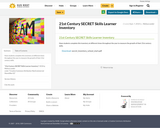
Have students complete this inventory at different times throughout the year to measure the growth of their 21st century skills.
- Subject:
- Education
- Material Type:
- Activity/Lab
- Assessment
- Homework/Assignment
- Date Added:
- 09/07/2018

Have students complete this inventory at different times throughout the year to measure the growth of their 21st century skills.
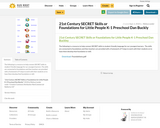
The following is a resource to help connect SECRET skills to student-friendly language for our youngest learners. The skills are connected to foundations and then teachers are provided with a framework of 9 steps to work with their students on to have them develop that foundation or skill.
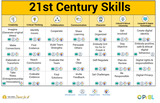
The following graphics contain:1. 21st Century Skills and their subskills2. 21st Century Skills, their subskills and connections to Factors Affecting Student Learning (FASA)
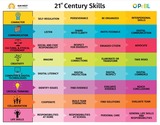
In today's world, 21st century skills are crucial for our learners as they provide the foundation for success in a rapidly evolving society. These skills, such as critical thinking, creativity, communication, collaboration, and digital literacy, equip children with the abilities to navigate complex challenges, adapt to change, and thrive in a globalized world. By nurturing these skills, we empower our learners to become agile, innovative, and socially responsible individuals who can actively contribute to the progress and well-being of our society.This resource has a 21st Century Skills poster, a big view 21st Century Skills Scope and Sequence document for grades 1-12, and a more focused view 21st Century Skills Scope and Sequence document for each of the following grade groupings 1-2, 3-6, 7-9, 10-12. This resource also has Digital Literacy Scope and Sequence documents for each of the following grade groupings 1-2, 3-6, 7-9, 10-12 (linked in each of the previous documents).
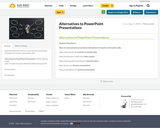
Death by PowerPoint?
Here are some awesome presentation alternatives for teachers and students alike.
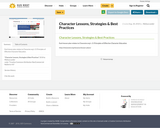
Each lesson plan relates to Character.org's 11 Principles of Effective Character Education.
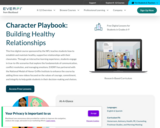
Character Playbook is an innovative digital course that uses engaging strategies to educate students about cultivating and maintaining healthy relationships during their critical middle school years. Comprised of six lessons that cover key concepts around positive character development, social-emotional learning (SEL), and building healthy relationships, Character Playbook allows students to engage with real-world scenarios, including examples of bystander intervention, resolving conflicts, effective communication, and positive relationships.
This Course Covers
Analyzing Influences
Understanding & Managing Emotions
Communicating Effectively
Resolving Conflicts
Stepping In
Making Decisions
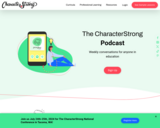
Explore the library of Podcasts to access short podcasts outlining activities that you can implement in your classroom right away.
Listen for free, anytime! Choose from the library of 295 podcasts.
Or sign up for the CharacterStrong Weekly to have the short, to-the-point podcasts delivered directly to your inbox.
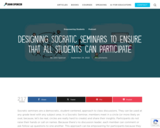
Socratic seminars are a democratic, student-centered, approach to class discussions. They can be used at any grade level with any subject area. In a Socratic Seminar, members meet in a circle and share their insights. Participants do not raise their hands or call on names. Because there’s no discussion leader, each member can comment or ask follow-up questions to one another. This approach can be empowering for participants because they own the conversation. Unlike a typical class discussion, the conversation moves fluidly back and forth rather than having to go through the teacher.
This article outlines several approaches to conducting a Socratic Seminar:
- The Giant Circle Approach
- The “Fish Bowl” Approach
- The Round Table Approach
- The Scattered Approach
- Multiple Seminars
- Online/Offline Seminars
The author also provides a sample of how to run a Socratic Seminar and tips for ensuring that all students can participate.
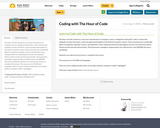
The Hour of Code started as a one-hour introduction to computer science, designed to demystify "code", to show that anybody can learn the basics, and to broaden participation in the field of computer science. It has since become a worldwide effort to celebrate computer science, starting with 1-hour coding activities but expanding to all sorts of community efforts. Check out the tutorials and activities. This grassroots campaign is supported by over 400 partners and 200,000 educators worldwide.
Students can code for just an hour, or complete full courses.
The courses are in 45 different languages.
There are even coding activities that can be down without computers called "unplugged".
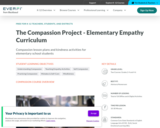
The Compassion Project for Character Development PeBL from Everfi
With so much emphasis placed on improvements in math and science, skills like compassion often receive less classroom time. This unintended trade-off may be short-sighted, as compassion is an important social-emotional skill that begins to develop in early childhood and is essential for lifelong health and success. Learning compassion increases students’ own sense of wellbeing and improves the learning environment for all learners. EVERFI’s new SEL program, The Compassion Project, is the first comprehensive, no-cost program designed to help educators facilitate lessons around fundamental SEL skills for students in grades 2-4, focusing on the complex but critical skill of compassion.
Grades 2-4 and about 45 minutes.
This Course Covers
Understanding Compassion
Self Compassion
Practicing Compassion
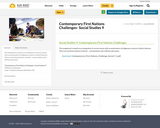
This assignment is based on an integration of current events with an examination of indigenous cultures in North America. There are two final products involved – a presentation and a fullclass discussion.

Thom Gibson shares his ideas on how to design student jobs for your classroom community.
This fits into Distribution of Leadership in our REORDER framework and fosters developing 21st century competencies or skills.
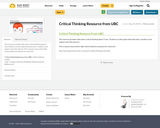
This resource provides video about critical thinking (about 7 min). Students can then apply what they learn, visualize it and explore more links about it.
This is a great resourced for high school students to prepare for university!
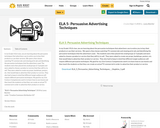
In my Grade 5 ELA class, we are learning about the persuasive techniques that advertisers use to entice you to buy their products or use their services. We spent a few classes watching TV commercials and viewing print ads and identifying the persuasive techniques that the advertisers used. The students were then placed into small groups (2-3 people) and were asked to choose a product or service that they will try to sell. They were asked to create any props, backdrops, posters, etc. that would help to advertise their product or service. They also had to keep in mind that different target audiences will require different persuasive techniques. My goal for my 21st Century Competencies work is to learn how to use imovie and then teach the students so that they can create an actual TV commercial in order to advertise their product or service.
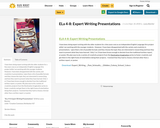
I have been doing expert writing with the older students for a few years now as an independent English Language Arts project while I am working with the younger students. However, I have been disappointed with the variety and creativity in presentations. I give them a list of possible formats and they choose the topic they are interested in researching and how they want to present what they have learned. Only 1 or 2 have been brave enough to deviate from the traditional written report, or poster. My plan was to do a variety of creativity projects from the Destination Imagination series to foster creativity and get them in the right frame of mind before doing their projects. I insisted that they had to choose a format other than a written report, or poster.

Plan for the Unexpected and Help Relieve Stress
Having to cover a class last minute? Need an emergency sub plan? Check out these easy, FREE activities from the CharacterStrong curriculum! Amidst this crazy time, the resources will help you pre-plan for the uncertainty of an educator absence or staff shortage.
Includes resources for:
- Prek-2
- 3-5
- 6-8
- 9-12
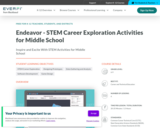
STEM is everywhere—from businesses and organizations to the products that power our daily lives. That’s why it’s important to build the first fully STEM literate generation. Endeavor is a first-of-its-kind interactive program designed for middle school students built to empower learners with the knowledge they’ll need to build their career pathways. Learners engage with interactive content that reinforces key STEM skills while discovering some of the exciting STEM opportunities that await.
This Course Covers
The Careers Powering STEM Industries
Big Data and the Internet of Things
The Future of Manufacturing and Design
The Algorithms Behind Recommendations
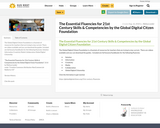
The Global Digital Citizen Foundation is a fountain of resources for teachers that are trying to stay current. There are videos available and you can download the guides. Included are full lessons/handbooks for the following fluencies:
Solution
Information
Creativity
Media
Collaboration
Global Digital Citizenship
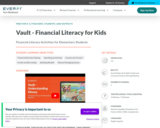
Vault is an interactive, online learning course specifically designed to teach financial education skills to young learners. Using the latest in new-media technologies and evidence-based learning, Vault brings complex financial concepts to life for today’s digital generation. With lessons on fiscal responsibility, money management, credit and borrowing, savings and more, Vault increase students’ basic financial literacy and builds the foundation of healthy financial decision-making at a young age.
Grades 4 to 6
This Course Covers
Responsible Money Choices
Income and Careers
Planning & Money Management
Credit & Borrowing
Insurance & Safety Management
Savings & Investing
Related Topics
K-12 Educators